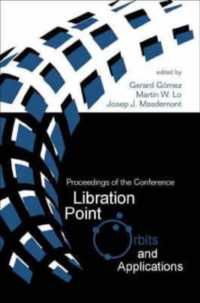Full Description
A groundbreaking book that explores the exciting intersection of technology and libraries. With a visionary approach, it delves into the potential of cutting-edge technologies like artificial intelligence, virtual reality, and blockchain in transforming the way libraries operate and engage with their communities. This book provides a wealth of information, covering topics such as curriculum development, teaching methodologies, industry trends, and career opportunities. With contributions from experts in the field, it offers a well-rounded perspective on the subject. Whether you're a student, educator, or industry professional, this handbook is an essential resource. Gain key insights, expand your understanding, and enhance your skills in the dynamic and ever-growing field of tourism and hospitality education.
Contents
Part 1 Management Models and Framework Library Services
Chapter 1 Best Practices in College Libraries: A Study with Special Reference to Dr. Ambedkar First Grade (Grant-in-Aid) College Shorapur, Yadagir District, Karnataka State
Chapter 2 ICT-Based Best Practices and Changing Role of Librarian in Academic Library Management
Chapter 3 Contribution of Foreign Authors in Indian Origin DESIDOC Journal of Library and Information Technology Based on SCOPUS Database During Periods 2012-2022: A Scientometrics Study
Chapter 4 Impact of e-Resources and Evidence Based Library Services in Educational Institutions
Chapter 5 Design and Development of User-Centered Services at Mirza Mehmood Beg Library, Zakir Husain Delhi College (University of Delhi), New Delhi: A Study
Chapter 6 Content Analysis of Library Website of Top 10 Colleges All India NIRF Ranking 2022 University of Delhi: A Study
Chapter 7 Digital Tools for Library Professionals
Part II Technology, Policy, and Innovation
Chapter 8 AI Chatbots in Academic Libraries: Challenges, Opportunities, and Best Practices
Chapter 9 Blended Learning: Changing Shape of Teaching and Learning in Higher Education
Chapter 10 The Strategic Use of Online Scholarly Tools in Libraries around Digital Inclusion
Chapter 11 Distribution of Knowledge Using Electronic Information Resources and Services by Shrimati Hansa Mehta Library Maharaja Sayajirao University of Baroda Gujarat India
Chapter 12 DESIDOC Journal of Library and Information Technology: A Bibliometric Analysis During 2012-2021
Chapter 13 Implications and Applications of Artificial Intelligence and Robotics in Academic Library Services
Chapter 14 Reinventing Academic Library Spaces in the IT Era: The Library as a Social Space on Campus
Chapter 15 Curriculum Development and Learning in Library and Information Science (LIS): A Review
Chapter 16 Implementation of Panjab University Electronic Theses and DissertationRepository (PU@ETD)
Chapter 17 Libraries as Centers of Continuing Education: Current Trends
Chapter 18 Open Education Resources and Constructivism: Few Perspectives from Learning and Libraries
Chapter 19 Tools and Policies to Identify Plagiarism
Chapter 20 Cloud Computing and Ranganathan's Laws of the Library Science: An Overview
Chapter 21 Assessment of the Constraints in the Provision and Utilization of Electronic Information Resources in Nigerian Polytechnics
Chapter 22 University Library: A Learning Source of Higher Education in India
Chapter 23 Library Services Provided by Kendriya Vidyalaya Libraries Using Online Tools During the COVID-19 Pandemic: A Survey
Chapter 24 Impact of Emerging Technologies on LIS Professional Development
Chapter 25 Plagiarism Detection Tools: An Overview
Chapter 26 Pareto's Principle- Evidence-Based Acquisition for Library Consortia with Special Reference to "One Nation, One Subscription"
Chapter 27 Surplus of Errors or Ease of Referencing, Where Accuracy Stands in Citation Tools
Part III Vision and Roles of the Future Academic Libraries
Chapter 28 Exploring the Roles and Responsibilities of School Librarians in Indian Context
Chapter 29 Gamification: A Current and Future Trend in Academic Libraries
Chapter 30 An Empirical Study of the Eco-friendly Green Library: A Haven for Sustainability and Learning
Chapter 31 Role of Academic Libraries in Implementation of National Education Policy 2020
Chapter 32 NEP and Higher Education: Issues and Challenges
Chapter 33 Data Visualization of Braille Literacy Research Literature
Chapter 34 Role of Librarians in Achieving Sustainable Development Goal 4 - Quality Education with New Age Marketing Skills
Chapter 35 Designing An Accessible Unit in Academic Library: A Case Study of Delhi University Library System
Chapter 36 E-Learning Resources in Academic Libraries in the Present Scenario
Chapter 37 Modern Libraries: Technological Issues and TrendsChapter 38 Human Development, Knowledge-Economy, and Libraries
Chapter 39 Advancements in the Use of Artificial Intelligence (AI) in Academic Libraries







